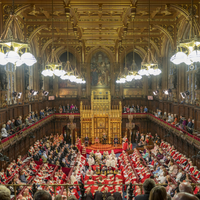Is the government doing enough to stave off the cost-of-living crisis in rural areas?
The Queen’s Speech made great play of the government’s commitment to strengthening the economy, levelling up and helping people with the cost-of-living crisis. But the proposed legislation appears bereft of new ideas for tackling disadvantage in rural areas.
Two Bills stand out. The Levelling up and Regeneration Bill, intends to “empower local leaders to regenerate their areas, and […] give residents more involvement in local development”. And the Energy Security Bill aims to “deliver […] transition to cheaper, cleaner, and more secure energy”.
At face value, these proposals sound laudable. We have long argued that rural communities should be given more powers to determine the future of their area. And the move to a Net Zero economy is a widely acknowledged necessity.
We should be excited. But unfortunately, we are not. There is very little by way of new financial support for the most vulnerable households, ambitions for energy security are limited to regional investment in large scale infrastructure, and proposals related to the planning system seem to place more emphasis on design and environmental impact than increasing the supply of affordable homes. The only glimmer of hope is the commitment to ensuring people have access to cash, a proposal expected in a Financial Services and Markets Bill.
The net outcome of these interventions is unlikely to make a dent on some of the most pressing issues driving up the cost of living in rural areas which in turn threatens the sustainability of local communities.
In the most immediate sense, those on lower incomes in the countryside are particularly vulnerable to the fuel crisis. Rural residents have some of the hardest to heat homes and many rely on heating oil which has displayed great volatility in price recently whilst not being covered by the Ofgem price cap. Without further financial aid, these people will increasingly face difficult choices between turning their heating on or putting fuel in their car to get to work. The Energy and Security Bill makes mention of “supporting industry to step up investment in growing the consumer market for electric heat pumps”, but this does not account for the fact that this technology may be unsuitable for many older properties, nor offer more basic support to help people to insulate their homes first.
We also think the government is missing a trick in terms of getting behind communities to enable them to develop local renewable energy solutions which would reduce their reliance on the national grid, contribute to net zero and potentially generate revenue that could be ploughed back into the area for the benefit of residents.
A longer-term issue that most definitely needs to be fixed is the availability and affordability of housing which is forcing many younger people and workers out of rural communities. Last year, the government announced a radical shake-up of the planning system with a focus on blanket land zoning to increase the supply of homes outside of protected landscapes. Many of these proposals appear to have been shelved in favour of a rough assemblage of initiatives intended to better manage (or possibly even restrict) development that comes forward. As such, measures prioritising environmental impact in planning decisions, along with strengthening neighbourhood plans to make it easier for communities to “limit speculative development” are in scope for the Levelling Up and Regeneration Bill.
Perhaps of most interest to us is a proposal to create a new “locally set, non-negotiable levy to deliver the infrastructure that communities need, such as housing, schools, GPs and new roads”. Government has indicated it is looking to scrap the existing Community Infrastructure Levy and S106 agreements. Whilst we support measures that will enable rural communities to reap dividends from development in their area, we will be looking to see whether the new mechanisms can also be used to deliver rural exception sites. These are often used by rural communities to secure small scale affordable housing developments that meet local needs.
Most importantly, we are concerned the government is falling short of measures which could alleviate the cost-of-living crisis in rural communities. Unless substantive support can be found to help vulnerable rural households find ways to reduce their energy bills, and the cost of housing driven down, many more people living in the countryside could find themselves out in the cold and facing a very difficult future.



